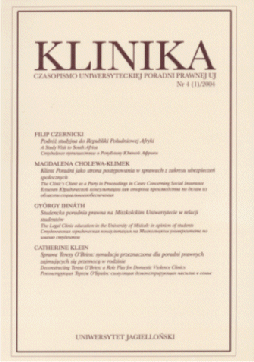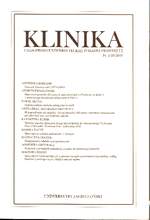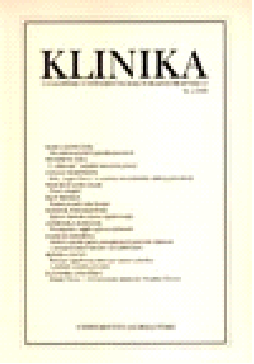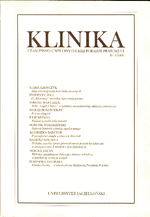Discussion list
The discussion group is designed for Polish legal clinics society. On the list we use only Polish language.
Sending messages:
This email address is being protected from spambots. You need JavaScript enabled to view it.
Subscribe list:
https://groups.google.com/g/kliniki
Unubscribe list:
This email address is being protected from spambots. You need JavaScript enabled to view it.
Moderator:
This email address is being protected from spambots. You need JavaScript enabled to view it.
Discussion groups www:
Amsterdam International Law Clinic
Goals and perspective
The Amsterdam International Law Clinic is an initiative of students and staff of the Faculty of Law of the University of Amsterdam. The Clinic provides legal services to clients on all questions of international law. It was established to meet the needs of students for more experience in treating cases and to meet the increasing demands from organisations, companies and law firms for legal advice on matters of international law. In international legal practice a growing interest exists for lawyers with a deeper understanding of the functioning and the application of international law and with experience in handling arguments based on international law. The Clinic offers students the possibility to gain such experience and at the same time to make contact with their future profession in a direct manner. This co-operation between organisations, companies and law-firms on the one hand, and students of international law on the other, is new in Dutch legal practice and the Clinic is therefore unique in the Netherlands.
Legal Services
The International Law Clinic provides legal services in individual cases, such as advise on a discrete question of international law. The International Law Clinic also can provide students for internships requiring specialised knowledge of international law. A fee will be required for the services of the Amsterdam International Law Clinic, but the costs will be relatively low.
The Clinic operates throughout the academic year, September through July. In most cases it will be able to provide legal services on short notice. The Clinic is able to provide a high quality of legal services by a strict process of selection for participating students based on their academic performance, and by a close supervision of the students by the ACIL staff.
Staff
The quality of the legal services provided by the Amsterdam International Law Clinic is guaranteed by close supervision of the students by the staff of the Department of International Law and the ACIL. A full list of members of the staff can be found at http://www1.jur.uva.nl/acil/staff.htm
The overall responsibility rests with prof. dr. André Nollkaemper and Joost P.J. van Wielink, LL.M.
Recent reports
- Enforced disappearances as continuing violations
- Establishing an individual complaints procedure against violations of international humanitarian law
- Fundamental rights and freedoms in the African Commission on Human and People's rights: an overview of the interpretation of the articles 6, 7, 9 and 26 of the African Charter on Human and People's Rights
- The competence of the European Court of Human Rights to order restitutio in integrum and specific orders as remedial measures in the case 46221/99
- Undue delay in the case law of the European Court of Human Rights: Varicak Marica v. Croatia Osiguranje
Associated organisations
In principle, legal services of the Amsterdam International Law Clinic are available for all clients. With a number of organisations and law firms, the Clinic has developed institutional contacts. From the start of the Amsterdam International Law Clinic in 2000, associations with the following organisations and law firms have been developed:
- International Alliances
- International Alliances International League for Human Rights
- Avocats sans Frontičres
- Van den Biesen Prakken Böhler - Attorneys at Law, Amsterdam
- International Criminal Defence Attoneys Association
Students
The Amsterdam International Law Clinic offers students who are in their final year the unique possibility to combine theory and practice of international law at the University of Amsterdam during an entire semester. Working in the Clinic gives you the chance to get in touch with lawyers, clients and cases that vary from international human rights law to European law, private international law, international criminal law or international environmental cases. During one semester you will work closely with other students and members of the staff on cases coming from international legal practice and give legal advice to clients of the Clinic.
Credits: 10 ECTS
Semester 1: September 2003 - January 2004
Semester 2: February 2004 - June 2004
Participants:
Students Rechtsgeleerdheid and students in International Law of foreign universities
Requirements:
- you must either have a thourough knowledge of or a more than average interest in international law
- you must be available to work in the Clinic during 5 months (one semester) for at least 8 hours a week
- you must follow the compulsory Clinic Course that includes lectures and visits to organisations and cliënts
- a lot of enthusiasm and interest in international law are indispensable!
Clinic Course:
During the time you participate in the Clinic, we will provide for a Clinic Course. This course will deal with various aspects of the legal profession and rendering legal services. Professionals from the field, both academics and attorneys, will address various topics as (amongst others): secrecy of files, international legal practice, liability, etc.
How to enroll:
Please send:
- an overview of courses and grades
- your curriculum vitae
- a paper or other written document of your hand that contains at least 5 pages
to mr. Joost van Wielink, c/o Secretariat of Public International Law, P.O. Box 19120, 1000 GC, Amsterdam
Under certain conditions students of foreign universities can participate in the Law Clinic. Basic knowledge of the Dutch language is a requirement though, since the obligatory Clinic Course will be given in Dutch. For more information please contact Joost van Wielink at This email address is being protected from spambots. You need JavaScript enabled to view it.
Contact
For further information on the use of the services of the Amsterdam International Law Clinic please contact Joost P.J. van Wielink at This email address is being protected from spambots. You need JavaScript enabled to view it.
Mail address
P.O. Box 19120
1000 GC AMSTERDAM
Visiting address:
Turfdraagsterpad 9
1012 XT Amsterdam
tel: 31 20 525 2961 / 2632
fax: 31 20 525 2684
History and activity of the legal clinics in Poland
The first legal clinic in Poland began its functioning in October 1997 at the Faculty of Law at Jagiellonian University, with the support of the Ford Foundation and following a conference on clinical legal education supported by the U.S. Embassy and other donors. Shortly afterwards, in 1998 legal clinics courses were introduced in the study program at Warsaw University, also with the support of the Ford Foundation.
The European Law Students Association (ELSA) played a great role in creation and development of the program. In May 1998 in Szczecin ELSA organized a conference: "Legal education reform. Development of the legal clinics idea". It was a good forum for discussion about clinical education in Poland, especially because it was combined with a National Congress of Polish Lawyers Union (Zrzeszenie Prawników Polskich) and National Congress of Law Faculty Deans. The conference in Szczecin resulted in a fast development of the clinical idea throughout the country. Within few years there has been 12 legal clinics established in Poland: Kraków, Warsaw, Białystok, Toruń, Poznań, Lublin, Rzeszów, Szczecin, Wrocław, Katowice, Łód and Gdańsk.
In December 2001 three representatives of Polish university based legal clinics were invited to go for a study visit to South Africa, where a very similar model of clinical education has been developed since the 1970-ties. Public Interest Law Initiative (PILI) at Columbia University in New York provided advice, technical support and organized the study tour. As a result of this, Polish legal clinics adopted a long term strategy and decided to set up the Legal Clinics Foundation.
There has been an essential growth of need for legal advice provided by the clinics and the idea is very popular among the students and faculty members. Clinical courses have been included into the education program at the law faculties and are treated as so called "specialization courses".
At present there are 25 legal clinics in Poland. Each year almost 2000 students, under supervision of over 350 law professors is dealing with around 12.000 cases. Clinic work is divided into sections supervised by the faculty teachers, i.e. sections of civil law, administrative law, labor law, criminal law, refugee law, and women rights. In addition students work with prisoners. Work of the students includes: written opinions, written statements, applications, appeals, claims, complaints and interventions.
An introduction to the clinical work includes lectures and seminars dedicated to the following matters: legal ethics, psychology of the communication with clients. The students also meet with the practitioners who explain all the problems of working with people seeking access to justice. After the introductory training the students are divided into different sections supervised by at least one faculty teacher.
Clients coming to the clinics are given a special form to fill in, and then the secretary assigns the case to relevant section or individual student (or more often couple of students). After the preliminary selection the student prepares the meeting with client based on the copies of documents and the problem's description included in the form. The meeting is to settle the facts of the case and analyze the problem. The supervisors or patrons are usually present during the first meeting with the client, and then the students arrange meetings themselves. The most important task is to prepare a particular solution and introduce it to the supervisor. The supervisor corrects it and gives advice until the final solution is completed. This is the moment when the student meets with the client and introduces a written proposal of the solution. Usually the procedure ends here but sometimes the case needs to be filed to the court. Legal clinics cooperate with legal practitioners who, on behalf of the clinic, run the case to the end.
Clinical Legal Education At Zhongnan University Of Economics & Law
Peng Xi Hua
Clinic Director
SJD. Associate Professor Of International law
And International Human Rights Law
Mao Ling
Vice-director
Lecturer Of Procedure Law
Li Sioux Qigong
Labor Law Clinic
Lecturer Of Constitutional and Administrative Law
Ma Chang Hua
Civil and Commercial Law Clinic
Associate Professor Of Civil and Commercial Law
Cheng Wei
Working Group Of Anti-domestic Violence
Postgraduate (2001) Of Procedure Law
Chao Xu Hui
Working Group Of Environment Protection
Undergraduate (1998) Of Law
Xiong Shi Yi
Retired Judge
Consultant Of Judicial Practice
Fu Lang
Licensed Lawyer
Consultant Of Lawsuit
Corresponding Address Of Legal Clinic Of Zhongnan University Of Economics & Law:
Legal Aid and Protection Center
Zhongnan University Of Economics & Law (Nanhu Section), Law School
Hongshan District, 430074, Wuhan, Hubei, China
The Clinical Legal Program was founded in September,2000 under the sponsorship of the Fordfoundation and Law School of Zhongnan University of Economics & Law. The Objective of the program is to train the undergraduates of law school and provide them with contact with practitioners.
The Clinical Legal Program is comprised of two clinics and two working groups which are Civil and Commercial Clinic, Labor Law Clinic and Working Group of Anti-domestic Violence, Working Group of Environment Protection. The clinical Legal Education is based on Legal Aid and Protection Center of Zhongnan University of Economics & Law which was founded in 26 May 2000. During every academic semester only a small number students- thirty on average-are admitted to clinics and working groups. They learn and study under the close supervision of professors and practitioners in the clinics.
The Clinical Legal Program is designed in two parts: Classroom Training and Practical Training. During every academic semester there are thirty-six hours for us to train students in classroom. Generally we train students such legal professional skills as Interviewing and Consulting, Communication, Negotiation, Legal Analytical Skills, Investigation, Social Responsibility and Legal Professional Ethics, Street Law, Case Analysis and Planning, Mock Trial and Attorney. Everyday there are three or four students work in Legal Aid and Protection Center to interview the live clients under the supervision of a professor. And chose the typical case for the clinics. Every month there should be a street legal consulting activity held by the students from the clinics. During an academic semester the clinics deal with thirty or thirty-five typical cases. At the end of every academic semester every students should submit a final report to the clinics and assess each other and get the reasonable credit (generally 3 credits every academic semester).
The Clinical Legal Program is carried in the office of Legal Aid and Protection Center which is located in the Nanhu campus of the University. The Center employs two consultants in the field of judicial practice and lawsuit. They are also the consultant of the Clinical Legal Program. The Center has three offices for the clinic students, a computer and the internet access is available.
'Klinika' Journal. POLISH LEGAL CLINICS JOURNAL
One of the important aspect of supporting the legal clinics is to enhance a debate on the methods and challanges of clinical education. Therefore, the Foundation regularly publishes a "The Clinic" magazine. Below, we present selected issues that Polish clinical students found particularly interesting.
1/ Active teaching methods
One of the characteristic features of Clinical Legal Education distinguishing it from other activities which are taught at law schools, is the usage of active teaching methods. They are used by academics, who are both supervisors within legal clinics and academics teaching regular classes. Clinical supervisors broaden the scope of active teaching methods, enriching them with new ideas. One of the ideas used by some legal clinics in Poland, is an introduction of audio-visual techniques as an active teaching methods, when working in legal clinics. The new teaching method is based on the recording of situational scenes, cases or simulated mock trials and moot courts, which are, after their technical development, the basis for conducting classes for the selected topic which corresponds with the theme of the film.
2/ Internship in Babsea
An Author as the first Polish law student participated at the Legal Studies Internship 2009, which was organized by the human rights non-governmental organization the Bridges Across Borders South East Asia in Thailand.
The Author prepared and taught workshops at the Juvenile Detention Center every week and awaken prisoners that although they are in a closed area, they are still human beings and have the same human rights as every person has. Besides the volunteering, during the internship, many meetings were organized with the interns, eg. the workshop with Malaysian students to discuss about the controversial topics related with law. The Author, after the end of the program, works in the Law Clinic at university and joined to the student's program "Street Law" to prepare absolutely new workshops about human rights, which are presented to pupils at schools.
3/ Section for the disciplinary affairs of students.
The article presents conducts of disciplinary proceedings in student's cases, legal basic, structure and functioning of new section, exemplary cases tried by the section of disciplinary affairs of students, showing positive aspects of this activity.
The section for the disciplinary affairs of students acts in the Student Law Office at the Faculty of Law and Administration at the University of Silesia.
The disciplinary responsibility of students called the quasi- penal responsibility of students is regulated in chapter 6 of the act from 27.07.2005- the Act of Higher Education and the rules laid down for implementation: disciplinary procedure for the students is regulated by the Ministry of Science and Higher Education from 6.12.2006.
Disciplinary proceeding commission rules about responsibility of the defendant. Appealing disciplinary proceedings commission serves students as a higher instance.
The student can be brought to justice in a disciplinary case through violation of university's law and acts against the dignity of the student.
Fraud, manhandling, punishable threat, battery, affray, theft can be the acts leading to expulsion from university. In these cases the defence is compulsory. If a student doesn't have a defender chosen by the themselves, the presiding judge appoints a student- defender ex officio from the section of the disciplinary affairs of students.
4/ Taking digital pictures and scanning files
The main issue is the lack of regulation of clinical students' rights to study court files and to copy them in various ways. Criminal Procedure Code regulates only the party's rights to investigate the court files and clinic clinical students are not considered as the litigants. This situation forces us to make use of the temporary solution based on article 156 § 1 of the Criminal Procedure Code which provides a possibility to file a motion to the President of the Court. After the President's consent is granted, students can study and copy court files. The ways of reproducing the files are not regulated in detail in the Criminal Procedure Code. In the author's opinion every copying technology is permitted, besides those, which can destroy files. Specifically, taking digital pictures and scanning files is permitted. Presented theory is confronted with the court's practice in Cracow based on the Department of Justice's circular letter.
5/ Issue how to evaluate the experience of working in a clinic can influence the future professional life of its members.
Most of the students have various expectations - some of them hope that clinic will help them to choose area of law to specialise in, others want to gain necessary skills and experience for future work. The article presents three stories of former members of the Warsaw University Legal Clinics . Although, they decided to choose different paths of carrier - one of them is currently engaged in social work, the other one is employed in one of the biggest law firm in Warsaw and the last one works at the Polish Constitutional Tribunal - they all unanimously stress that "the adventure with clinic" was the best experience they had during studies. Due to clinical experience they learned how to apply legal regulations in practice and how to perceive real people and their tragedies beyond paragraphs. They also mentioned that thanks to the tutors they had worked with, their point of view about many topics has changed. All of them truly enjoyed clinical semminars and at the end, they all admitted, that in their opinion joining the clinic should be obligatory for all the law students at Warsaw University. The article also aims to show how one person (in this case a tutor from the clinic) can influence life of a single student by helping him to see and choose the best path of carrier according to his interests.
6/ Recruitment process
The most important issue is to highlight the features of an ideal member of the clinic. It could be done in many different ways - checking his/her previous university records (the key ones, i.e. civil procedure, contract law, criminal law, etc.), other activities and last but not least - attitude towards charity work. Once there is a decision concerning the criteria, each clinic needs to choose the way of recruiting its members. It could include, depending on different matters, one, two or three stages. The interview itself should be conducted by at least two persons, including a person from the directors board and the clinical supervisor , in order to maintain the objectivity.
Needless to say, most of the candidates have not had any previous professional legal practice, but at least logical thinking and proper responding are required. Also, the individual approach is essential. It is very important to mix students at different levels of legal and social skills in order to provide them a challenging work environment. All the above mentioned issues, combined with a flexible approach towards the student, should guarantee a well organized and well functioning legal clinic.
Editorial office:
Fundacja Uniwersyteckich Poradni Prawnych
ul. Szpitalna 5 lok. 5
00-031 Warszawa
tel.: 22 829 91 29 w. 143
e-mail: This email address is being protected from spambots. You need JavaScript enabled to view it.
Publisher:
Wydawnictwo C.H. Beck Sp. z o.o.
ul. Bonifraterska 17 (budynek North Gate)
00-203 Warszaw
Archive issues with articles in English:
"Klinika" nr: 4 (1)/2004
The content of the issue is available by clicking on the cover (PDF file 8.6 MB).
"Klinika" nr: 3/2000
The content of the issue is available by clicking on the cover (PDF file 12 MB).
"Klinika" nr: 1 (2)/2000
The content of the issue is available by clicking on the cover (PDF file 16 MB).
"Klinika" nr: 1/2000
The content of the issue is available by clicking on the cover (PDF file 6.5 MB).













